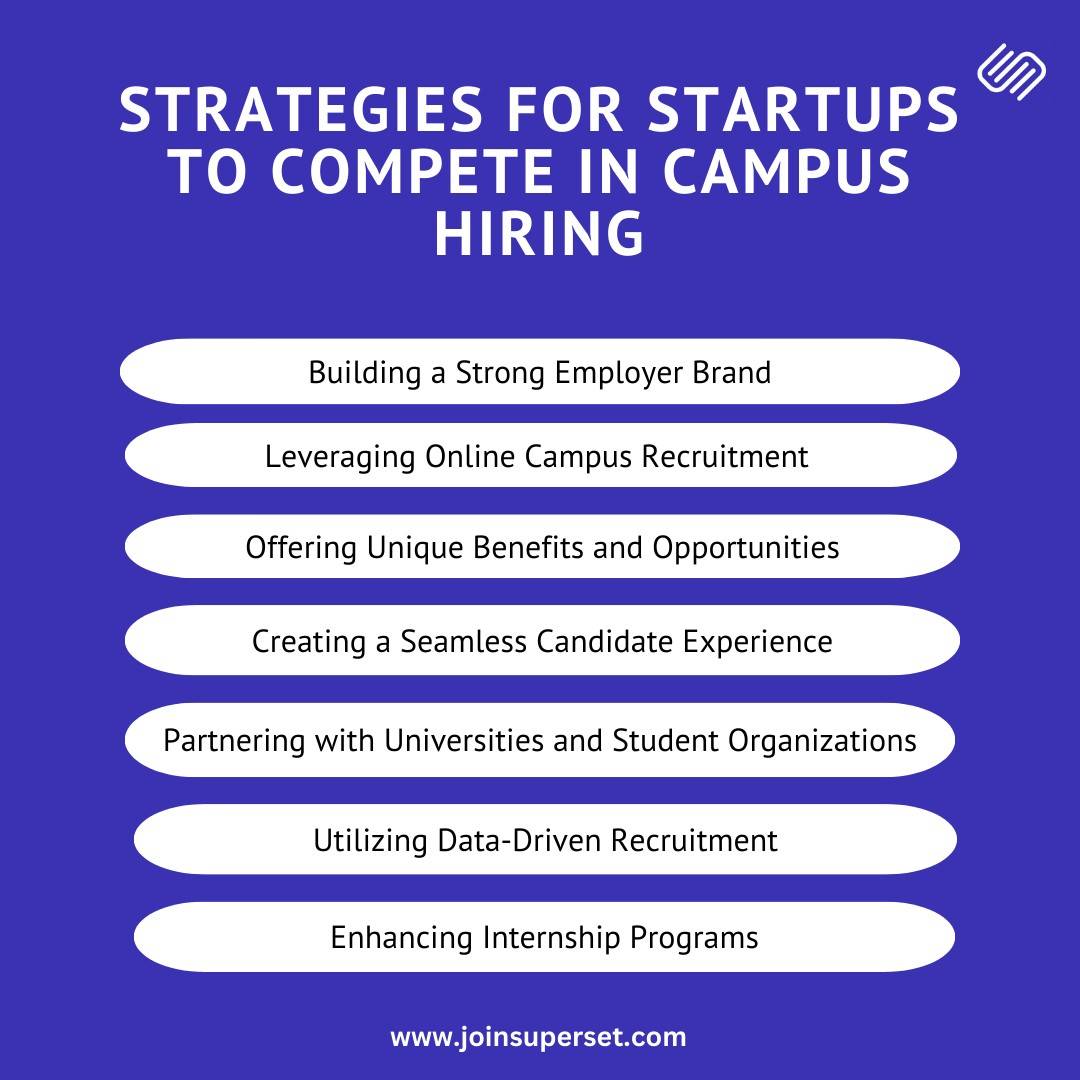In today’s competitive job market, attracting top talent is crucial for startups aiming to establish themselves and grow. Campus hiring has become a vital strategy for sourcing fresh, innovative minds. However, competing with big companies in campus hiring can be challenging due to their established brands and substantial resources. This blog explores strategies that startups can implement to successfully compete with large corporations in campus hiring, leveraging tools such as online campus recruitment and virtual recruitment platforms.
The Importance of Campus Hiring for Startups
Campus hiring provides startups with access to a pool of fresh graduates who bring new perspectives, energy, and up-to-date knowledge. These candidates are often eager to learn and grow within a company, making them ideal for startups looking to build a dynamic and innovative team. Moreover, hiring directly from campuses allows startups to shape and mould these young professionals to fit their unique cultures and business goals.
Challenges Startups Face in Campus Hiring
Startups face several challenges when competing with large companies in campus hiring:
- Brand Recognition: Big companies often have well-established brands that are instantly recognizable to students.
- Resources: Large corporations typically have more resources to invest in recruitment efforts, including attending multiple campus events, offering higher salaries, and providing extensive benefits packages.
- Trust and Stability: Students may perceive larger companies as offering more job security and career advancement opportunities.
Despite these challenges, startups can successfully compete by adopting innovative strategies and leveraging technology.
Strategies for Startups to Compete in Campus Hiring

1. Building a Strong Employer Brand
A strong employer brand is crucial for attracting top talent. Startups can build a compelling brand by:
- Showcasing Company Culture: Use social media, blogs, and your website to highlight your unique company culture, values, and mission. Share stories and testimonials from current employees about their experiences working at your startup.
- Engaging Content: Create engaging content that resonates with students, such as videos, articles, and infographics that highlight your startup’s exciting projects, growth opportunities, and innovative work environment.
- Participating in Campus Events: Actively participate in campus events, such as job fairs, career talks, and workshops. Engage with students and faculty to build relationships and increase your startup’s visibility on campus.
2. Leveraging Online Campus Recruitment and Virtual Recruitment Platforms
Technology has revolutionized the recruitment process, making it easier for startups to compete with larger companies. By leveraging online campus recruitment and virtual recruitment platforms, startups can reach a broader audience and streamline their hiring process.
- Virtual Campus Recruiting Software: Utilize virtual campus recruiting software like Superset to connect with students from various universities without the need for physical presence. These platforms enable startups to conduct virtual interviews, host online career fairs, and engage with students through webinars and virtual info sessions.
- Campus Recruitment System: Implement a campus recruitment system that automates and manages the entire recruitment process, from sourcing candidates to onboarding. This system can help startups efficiently track applicants, schedule interviews, and maintain communication with candidates.
3. Offering Unique Benefits and Opportunities
While startups may need help to match the salaries and benefits offered by large companies, they can provide unique opportunities and perks that appeal to students.
- Career Growth: Emphasize the potential for rapid career growth and the opportunity to take on significant responsibilities early in their careers. Highlight success stories of employees who have quickly advanced within the company.
- Flexible Work Environment: Offer flexible work arrangements, such as remote work options and flexible hours, which can be particularly appealing to younger generations.
- Equity and Ownership: Consider offering equity or stock options to new hires, giving them a sense of ownership and a stake in the company’s success.
4. Creating a Seamless Candidate Experience
A positive candidate experience is crucial for attracting top talent. Startups should focus on creating a smooth and efficient recruitment process that leaves a lasting impression on candidates.
- Clear Communication: Maintain clear and consistent communication with candidates throughout the recruitment process. Provide timely updates on their application status and feedback after interviews.
- Streamlined Process: Simplify the application and interview process to make it as seamless as possible. Use virtual recruitment platforms to conduct interviews and assessments, reducing the need for candidates to travel.
- Personal Touch: Personalize the recruitment experience by tailoring interactions to each candidate. Show genuine interest in their skills, experiences, and career aspirations.
5. Partnering with Universities and Student Organizations
Building strong relationships with universities and student organizations can give startups a competitive edge in campus hiring.
- University Partnerships: Establish partnerships with universities to gain early access to top talent. Participate in university-sponsored career events and collaborate on research projects or internship programs.
- Student Organizations: Engage with student organizations and clubs related to your industry. Sponsor events, offer guest lectures, and provide mentorship opportunities to build rapport with students.
6. Utilizing Data-Driven Recruitment
Leveraging data and analytics can provide startups with valuable insights into their recruitment process, helping them make informed decisions and improve their campus hiring strategies.
- Tracking Metrics: Monitor key recruitment metrics such as application rates, interview success rates, and time-to-hire. This data can help identify bottlenecks in the recruitment process and areas for improvement.
- Candidate Feedback: Collect feedback from candidates about their recruitment experience. Use this feedback to refine your process and address any pain points.
- Predictive Analytics: Utilize predictive analytics to identify the most promising candidates based on their resumes, interview performance, and other relevant data. This can help streamline the selection process and improve hiring outcomes.
7. Enhancing Internship Programs
Internship programs are a valuable tool for startups to engage with potential future employees and evaluate their fit within the company.
- Structured Programs: Develop structured internship programs that provide students with meaningful projects and learning opportunities. Ensure interns receive regular feedback and mentorship to enhance their experience.
- Pathway to Full-Time Employment: Communicate the potential for internships to lead to full-time positions. Highlight success stories of former interns who have transitioned into permanent roles within the company.
- Engagement Activities: Organize events and activities for interns to connect with full-time employees and learn more about the company’s culture and mission. This helps build a sense of belonging and increases the likelihood of interns accepting full-time offers.
Leveraging Technology in Campus Recruitment
Online Campus Recruitment
Online campus recruitment allows startups to reach a wider audience and connect with students from various universities. By leveraging online platforms, startups can showcase their brand, post job openings, and interact with potential candidates.
- Job Portals: Use popular job portals and university career websites to post job openings and internship opportunities. Ensure your job descriptions are clear, and engaging, and highlight the unique aspects of your startup.
- Social Media: Leverage social media platforms such as LinkedIn, Twitter, and Instagram to promote your job openings and share insights into your company culture. Use targeted ads to reach specific student demographics.
Virtual Recruitment Platforms
Virtual recruitment platforms have become increasingly popular, especially in the wake of the COVID-19 pandemic. These platforms enable startups to conduct virtual interviews, and assessments, and even host virtual career fairs.
- Virtual Interviews: Use video conferencing tools to conduct interviews, allowing you to connect with candidates from different locations. Prepare structured interview questions and provide candidates with guidelines on how to prepare for virtual interviews.
- Virtual Career Fairs: Participate in or host virtual career fairs to engage with students from various universities. Use interactive tools such as live chats, webinars, and virtual booths to provide information about your startup and job opportunities.
Campus Recruitment System
Implementing a campus recruitment system can help startups streamline their recruitment process and improve efficiency.
- Applicant Tracking: Use an applicant tracking system (ATS) to manage and track applications. An ATS can help you filter and sort candidates based on specific criteria, making it easier to identify top talent.
- Automated Communication: Automate communication with candidates to ensure timely updates and responses. Use email templates and scheduling tools to streamline communication and interview scheduling.
- Data Analytics: Leverage data analytics to track the effectiveness of your campus recruitment efforts. Analyze metrics such as application rates, interview success rates, and time-to-hire to identify areas for improvement.
Conclusion
While competing with big companies in campus hiring can be challenging, startups can succeed by leveraging their unique strengths and adopting innovative strategies. By building a strong employer brand, leveraging technology such as online campus recruitment and virtual recruitment platforms, offering unique benefits and opportunities, creating a seamless candidate experience, and partnering with universities and student organizations, startups can attract and retain top talent. Additionally, utilizing data-driven recruitment and enhancing internship programs can further improve the effectiveness of your campus hiring efforts. Embrace these strategies to win the talent war and build a dynamic, innovative team to drive your startup’s success.








